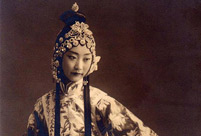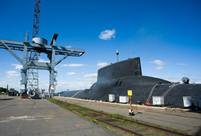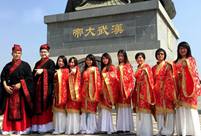

BEIJING, July 7 -- As U.S. President Barack Obamahosts Communist Party of Vietnam (CPV) chief Nguyen Phu Trong at the White Houseon Tuesday, the two countries are embracing a highly symbolic moment in their postwar engagement.
The Vietnam-U.S. detente is a welcome and heartening achievement in the evolution of international relations. It accords with the prevailing trend of the times -- peace and cooperation -- of which China is a principal founder and determined defender.
The CPV general secretary's visit to the United Statesis, without doubt, of historic importance. It culminates a dramatic rapprochement between the two erstwhile implacable foes over the past six decades, and is poised to usher Vietnam-U.S. relations into a new era.
The two countries were mortal enemies for over 20 years till the end of the Vietnam War in 1975. It took them another 20 years to establish diplomatic ties. And now they are comprehensive partners celebrating the 20th anniversary of their normalized relationship and pledging more and closer cooperation.
A telling sign of their eagerness for stronger relations is that President Barack Obama's administration invited Trong to the United States although the latter's position has no equivalent in the American government system.
Vietnam and the United States have good reason to cement their partnership. They are economically complementary, bilateral trade is booming, and both are among the 12 countries negotiating the Trans-Pacific Partnership. More practically, one friend made is one foe less.
Given such an overall backdrop, the Trong-Obama meeting, momentous as it is, is in line with the generally upward trajectory of Vietnam-U.S. ties in the past 20 years and should not be overinterpreted.
Speculations that Washington has managed to rope Hanoi into its elaborate scheme to preserve the U.S. hegemonic presence in Asia in the face of an ascending China are childish and fallacious.
The line of thinking behind them, rooted in the Cold War mentality of confrontation, diminishes the significance of Trong's U.S. visit, scorns Hanoi's independent foreign policy, and disregards the true big picture of China-Vietnam relations.
Indeed, Washington's behavior on Asia-Pacific affairs in the past few years is suggestive of a sophisticated strategy to exploit for its own gains the chronic, complicated territorial disputes between China and some of its neighbors in South China Sea.
Yet those assuming that Hanoi, a rival claimant, has been flimflammed by Washington into an anachronic plot against China fail -- or choose not -- to heed the fact that the Vietnamese government practices an independent foreign and defense policy and has some baselines not to be surrendered.
More important is the traditional close attachment between China and Vietnam. It has been defined as good neighbors, good friends, good comrades and good partners, and it is a profound bond both nations cherish and are resolute to carry on and firm up.
They have their due share of the old and new problems that accompany state-to-state relations. But the two sides have eloquently demonstrated -- with Trong's successful visit to China in April as one example -- their will and capability to properly deal with their differences and keep their relationship sailing in the right direction.
Beijing and Hanoi are mature enough to handle their relations beyond the bilateral scope. It is naive to expect either of them to turn into a cat's-paw in someone else's geopolitical gimmickry at the cost of their dear camaraderie.
 Evolution of Chinese beauties in a century
Evolution of Chinese beauties in a century Creative graduation caps of ‘vigorous elves’
Creative graduation caps of ‘vigorous elves’ Typhoon class strategic Submarine in photos
Typhoon class strategic Submarine in photos Hong Kong college students feel the charm of Hanfu
Hong Kong college students feel the charm of Hanfu Japan’s crimes committed against "comfort women"
Japan’s crimes committed against "comfort women" Odd news:“carrying a rod and asking to be spanked”
Odd news:“carrying a rod and asking to be spanked” Legendary life of a bee-keeping master in Hainan
Legendary life of a bee-keeping master in Hainan 4-year-old cute 'monk' spends summer holiday in temple
4-year-old cute 'monk' spends summer holiday in temple Hong Kong in lens
Hong Kong in lens Editorial: An uncertain road ahead for Greece and EU
Editorial: An uncertain road ahead for Greece and EU China’s class of 2015 gets creative with graduation photos
China’s class of 2015 gets creative with graduation photos Girl power on the pitch
Girl power on the pitch Giant panda Yuanzai turns two at Taipei Zoo
Giant panda Yuanzai turns two at Taipei ZooDay|Week